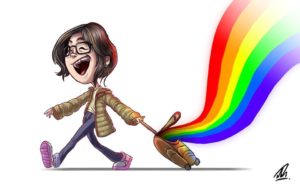In 2015, Lee Morin became a featured blogger for The Needy Animator. Here is part 1 in 4 installments concerning copyright law basics for freelance artists.
Copyright for the Freelance Artist Pt 1, by Lee Morin, Esq.
OF COPYRIGHT, CONTRACTS, AND FAN ART
If you are reading this blog, words like “manga,” “cosplay,” or “doujinshi,” may seem ordinary. To the uninitiated, these words are foreign; but, if you have heard of Pokémon, or Dragon Ball Z, then you know “manga.” [1]My first encounter with manga was the film adaptation of Akira, and later with Ghost in the Shell, whose soundtrack is as haunting as its subject matter. Following in the footsteps of the crossover tradition was the epic film adaptation, Final Fantasy: The Spirits Within, from the successful media franchise Final Fantasy, which, “centers on a series of fantasy and science fantasy role-playing video games, but includes motion pictures, anime, printed media, and other merchandise[2].”
The film adaptation of Final Fantasy was the first photorealistic computer animated feature film, and most expensive to produce at $137 million with a staff of 200 at 960 workstations rendering 141,964 frames over a span of four years[3]. Despite its over $85 million success at the box office, which gross earnings exceeded Akira and Ghost in the Shell by $74 million and $83 million, respectively, Final Fantasy: The Spirits Within comparatively tanked, leaving its backers in the lurch by over $50 million. With such high stakes, it becomes apparent why Japanese animation, its predecessor, manga, and its fan art, doujinshi, anime music videos, and cosplay, are a source of livelihood and intrigue for those, who appreciate their unique creative aspects.
BOOK DEFINITION OF COPYRIGHT
You may wonder how such a seemingly ennui-filled topic as copyright law plays a part in the fascinating world described above. (INSERT IMAGE FROM Aki’s Fanart merchandise)
The definition of copyright is an original work of authorship fixed in a tangible medium of expression[4]; therefore, consider how many authors are involved in producing manga, doujinshi, or animation and in each case the definition can be applied.
To qualify for copyright, work must be “original,” or conceived independently by the author(s), and set into a tangible medium of expression, such as captured in a drawing, computer animation, or recording.
Cosplay, or costume play, does not qualify for copyright if the wearer merely copies a specific character; however, if the wearer draws an original outfit (to make and wear later), then the drawing and any custom-made jewelry (i.e. accessories) qualify for copyright protection.
Work must not only be independently created, but also sufficiently creative. The legal threshold for creativity is, “extremely low; even a slight amount will suffice[5];” however, the more your work presents unique creative aspects, the easier it is to prove a case of copyright infringement in the event that you find someone has used your work without your permission.
HOW TO REGISTER FOR COPYRIGHT: The Basics
Once you decide that your work may qualify for copyright in the United States, you may consider registering it with the federal authority, the Copyright Office.
The expense is quite low to register a work or collections of works, which may also be done online. There is relatively little examination; therefore, barring any patent errors, and assuming you read the instructions for how to fill out an application correctly, you may apply for copyright registration of your own work. If you are hesitant to complete the application yourself, you can always hire a qualified attorney to assist you, which can set your mind at ease depending on the complexity of the work or works to be registered.
What Types of Work qualify for Copyright Registration?
The main subject matters that qualify for copyright registration are literary works; musical works (including lyrics); dramatic works (including music); pantomimes and choreographic works; pictorial, graphic, and sculptural works; motion pictures and other audiovisual works (including interactive games); sound recordings; and architectural works[6].
Benefits of Copyright
Once registered, the copyright provides its holder with a number of benefits. First, the world is put on notice that you have claimed authorship or ownership in a particular work. Since March 1989, it has not been necessary to place a © on work to maintain the validity of a copyright registration; however it is advisable to mark your work with a © even if you do not register it, as common law rights are still available.
Second, you now have the legal right to exclude others from infringing on your rights as a copyright holder, which are, briefly, the right to reproduce or copy; to prepare derivative works; to distribute to the public; to perform the work publicly; to display the work publicly; and in the case of sound recordings, to perform the work publicly by means of a digital audio transmission[7]. The right to exclude others from your copyright rights is a powerful asset and exemplifies that registration grants a temporary monopoly on use of your work. When combined with a diverse number of uses (e.g., copying, distribution, performance), exclusivity can become a lucrative business if you know how to parse the rights correctly.
Third, if you ever find yourself the victim of copyright infringement, that is, use of your work without permission, then a registered copyright will not only provide its holder with access to the courts for the purpose of enforcement, but also with access to statutory damages, which can range in the thousands of dollars per violation.
HOW LONG DOES COPYRIGHT LAST?
Exclusive rights under copyright can last a long time, and unlike trademarks, do not necessarily require that they be enforced every time there is a violation in order to maintain their integrity. A copyright currently lasts the lifetime of its author plus an additional seventy years[8]. In the case of more than one author, then the additional seventy years begins upon the decease of the last surviving author[9].
If the work is anonymous, pseudonymous, or a work made for hire, the copyright endures for ninety-five years from its first date of publication or one hundred twenty year from its creation, whichever expires first[10]. Copyright duration is therefore controlled by the identity of the author, a critical detail when completing your application for registration of federal copyright. For example, if you create a work for hire, the identity of the author is the employer or person commissioning the work; thus, duration is controlled not by the artist’s lifespan, but its date of creation or publication.
Now that you know what it means to hold a copyright, how to register one, and its benefits, you are better equipped to negotiate your rights at the bargaining table with prospective clients or employers. In part 2 of our blog, we will delve into the longstanding controversy between Jack Kirby and Marvel Comics to demonstrate the importance of the employment agreement. Then, we will discuss three main employment agreements that you are likely to encounter as a freelance artist.
__________________________________________________________________________
Our next blog will discuss basic contracts, the importance of employment agreements, types of agreements for performing services, and how each type of agreement shifts ownership (and authorship) of the work product between employer or contractor and employer.
DISCLAIMER: THE INFORMATION CONTAINED IN THIS BLOG IS FOR INFORMATION PURPOSES ONLY AND IS NOT TO LEGAL ADVICE.
[+]
| 1 | http://en.wikipedia.org/wiki/Manga |
|---|---|
| 2 | http://en.wikipedia.org/wiki/Final_Fantasy |
| 3 | http://en.wikipedia.org/wiki/Final_Fantasy:_The_Spirits_Within |
| 4 | 17 U.S.C. § 102(a) |
| 5 | Feist Publications, Inc. v. Rural Telephone Service Co., 499 U.S. 340, 345 (1991). |
| 6 | 17 U.S.C. § 102(a)(1)-(8) |
| 7 | 17 U.S.C. § 106 |
| 8 | 17 U.S.C. § 302(a) |
| 9 | 17 U.S.C. § 302(b) |
| 10 | 17 U.S.C. § 302(c) |




